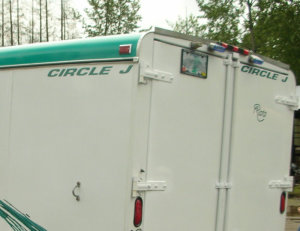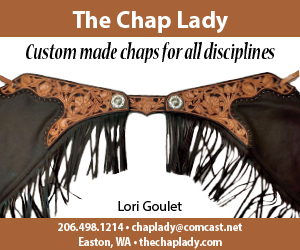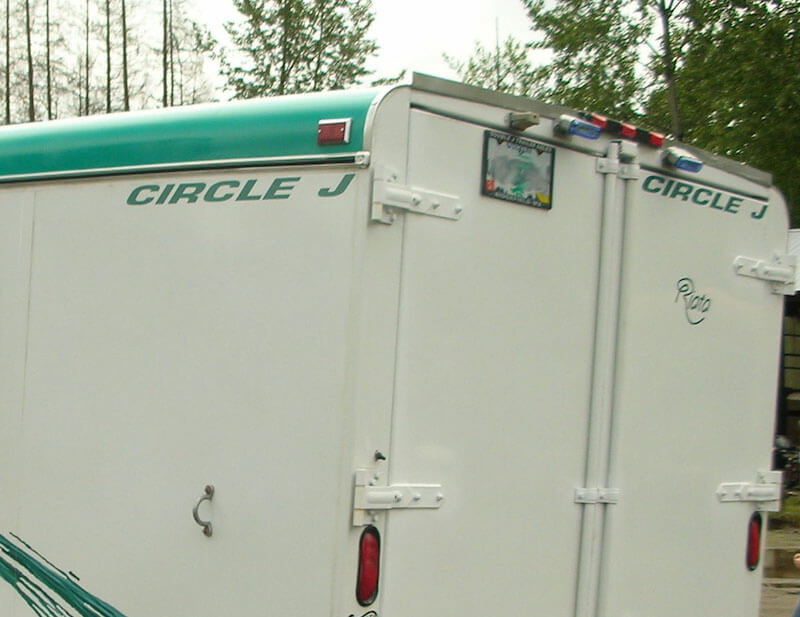Lights, Action, Roll ‘em: Auxiliary Lighting
By: Leigh Goodison Grieve
 The lights and brake system on your trailer operate when they are hooked up to your tow vehicle. If all the wiring and connections are unbroken, clean and properly grounded, then you should be receiving power to your brake system and lights. If any of the systems are not working then you have to look for the problem, which in many cases is just improper grounding, a burned out bulb or a blown fuse in your truck. However, newer trucks have their own separate fusing system under the hood to feed the trailer.
The lights and brake system on your trailer operate when they are hooked up to your tow vehicle. If all the wiring and connections are unbroken, clean and properly grounded, then you should be receiving power to your brake system and lights. If any of the systems are not working then you have to look for the problem, which in many cases is just improper grounding, a burned out bulb or a blown fuse in your truck. However, newer trucks have their own separate fusing system under the hood to feed the trailer.
A broken wire or bad splicing may require a person who is knowledgeable about electrical wiring to track down the problem, which may be hidden in the tubing framework, or underneath the trailer. Another reason for your wiring system not working may be due to the electrolysis that is created from using aluminum rivets to ground the system, which will oxidize and fail.
It is a good idea to carry spare light bulbs for your trailer, as well as spare fuses for your truck. The correct size of truck fuse should be listed in the owner’s manual for your tow vehicle, or contact a dealership or manufacturer.
The lighting system of your trailer should never be hooked up to the breakaway battery. This is for the emergency breakaway brake system only and needs to be maintained for that purpose and that purpose alone! People who utilize their auxiliary battery and or their breakaway battery as a source for supplemental light are setting themselves up for problems because once the battery is discharged it is not capable of energizing the brake system in an emergency situation.
An auxiliary battery that can work your lights when you’re not hooked up to a tow vehicle can be installed separate from the emergency breakaway battery system. The auxiliary battery will eventually drain down when used, so it is important to recharge it when you’re stationary by plugging it into a charger for that purpose, such as an exterior AC outlet of your house that will maintain it and shut off when fully charged. If you are not a frequent hauler your battery will not have enough time to charge just by hooking up to your tow vehicle and driving for a few miles once in a while. Another alternative is to carry a portable gas generator and there are many good, inexpensive units on the market.
For people who trailer overnight or under dark conditions, exterior lighting is a must for safety as well as potential theft prevention. A well-lit interior makes it more inviting for loading a horse at night, as few horses wish to venture into a small dark space. More lighting on the exterior makes your trailer a safer place to be and horse will be less anxious as well. Additional exterior floodlights can be installed all around the trailer, including specialized lights with remote control switches. You are then able to turn on the lights from a distance, allowing you to easily identify your trailer location and warn off anyone with a mind to breaking in or bad intentions.
For occasional use inside the tack room or stall area of the trailer, inexpensive LED lights with magnetic backs or hooks (for using on an aluminum surface) are a great way to light up a dark space. If you use them on the trailer exterior, remember to remove them before driving off or you will likely lose them somewhere on the road
Tip of the month: Ramps need to be on a level surface when the horse is on it, otherwise they will tweak out of alignment and possibly break a hinge. If you have a trailer with a ramp, be sure to carry a couple of foot long 2×4’s that can support it and compensate for the uneven ground.
“The Secret Lives of Horse Trailers” will be released on DVD this summer. For more information visit www.handyrider.com* or email [email protected].
*This link was not active at the time this article was added to the website in 2018
Published October 2011 Issue

The Northwest Horse Source is an independently owned and operated print and online magazine for horse owners and enthusiasts of all breeds and disciplines in the Pacific Northwest. Our contemporary editorial columns are predominantly written by experts in the region, covering the care, training, keeping and enjoyment of horses, with an eye to the specific concerns in our region.






